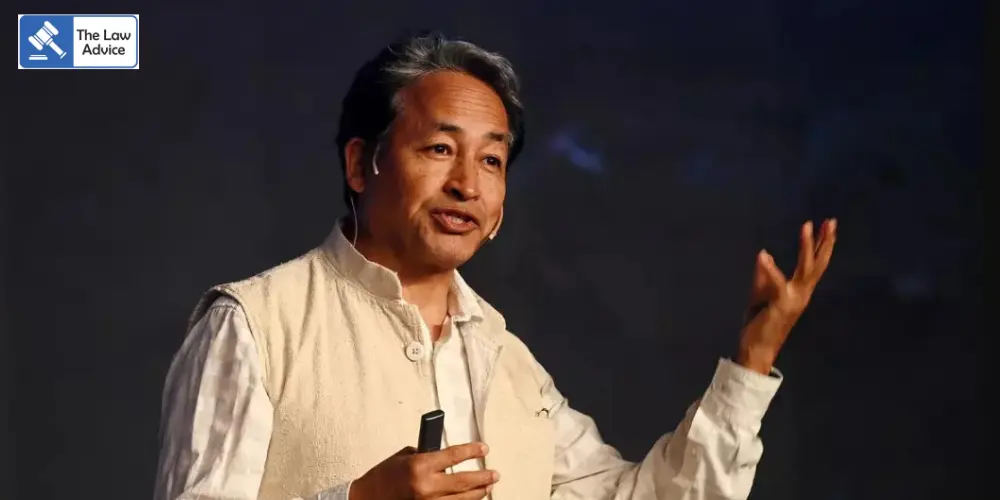
Dr. Gitanjali Angmo has approached the Supreme Court with an amendment application challenging the preventive detention of her husband, noted Ladakh environmentalist and social activist Sonam Wangchuk, under the National Security Act (NSA), 1980.
In her amended plea, Angmo has raised additional grounds, asserting that the detention order is legally unsustainable, as it relies on irrelevant and outdated FIRs, extraneous material, and incomplete information. She contends that the authorities have acted with arbitrariness and violated constitutional and statutory safeguards.
Detention Based On Irrelevant And Outdated FIRs
The plea argues that the detention order cites five FIRs, of which three are over a year old and none of these name Wangchuk as an accused. The fifth FIR, registered just a day before his detention, vaguely refers to “unknown miscreants” who allegedly instigated protestors and resorted to stone pelting at the Ladakh Autonomous Hill Development Council (LAHDC) office.
Only one FIR directly mentions Wangchuk, filed soon after he became a member of the Apex Body Leh (ABL), but it pertains to unrelated events, Angmo contends.
“The detention order is vitiated by reliance on stale, irrelevant, and extraneous FIRs, most of which bear no proximate or rational nexus to the preventive detention ordered in September 2025,” the plea states.
“Out of five FIRs, four do not name Mr. Wangchuk, and three are against unknown persons, rendering the detention order arbitrary and unsustainable in law.”
False Narrative That Wangchuk Instigated Protests
Angmo’s petition rejects the claim that Wangchuk instigated the ABL to organize protests. It clarifies that both ABL and the Kargil Democratic Alliance (KDA) had already announced plans for intensified agitation if the Ministry of Home Affairs (MHA) failed to resume talks, much before Wangchuk’s formal association with ABL in 2025.
Following internal developments, the ABL leadership invited Wangchuk to join its High Powered Committee (HPC) and a sub-committee for dialogue with the MHA. However, the MHA reportedly objected to his inclusion, despite the ABL and KDA insisting that the composition of their delegation was their independent prerogative.
“The allegation that Wangchuk instigated protests is factually baseless,” the plea asserts. “He neither held any decision-making authority at that time nor called for demonstrations; on the contrary, his involvement focused on peaceful dialogue and coordination.”
Misinterpretation Of Wangchuk’s Speech On Regional Governments
The application also challenges the detaining authority’s selective quotation of Wangchuk’s speech, where he referenced political changes in Nepal, Sri Lanka, and Bangladesh. The petition points out that the authorities omitted the immediate clarifying sentence where Wangchuk explicitly emphasized non-violence and peaceful revolution.
“Unlike those countries, in Ladakh it won’t be through violence or weapons,” Wangchuk had said in the same speech. “We can have a peaceful revolution — through fasting and moral example.”
Angmo argues that this omission distorts the intent of his words, portraying them misleadingly as incitement rather than advocacy for peace, and thus calls for strict judicial scrutiny.
Grounds Of Detention Not Fully Supplied Within Statutory Limit
Angmo further alleges serious procedural violations under Sections 8 and 11 of the NSA. She submits that the full grounds of detention were not supplied within the five-day limit, and Wangchuk was provided an incomplete order three days after his arrest on September 29, 2025.
The documents referenced four videos, which were not shared with him until October 23, nearly 28 days later, and only after the Advisory Board directed their disclosure. This delay, she argues, deprived him of a meaningful opportunity to make an effective representation against his detention.
Despite multiple written requests by Wangchuk and Angmo seeking the missing material, no official response was received. She also claims that certain “recommendations” relied upon for the detention were never included in the official record.
According to Angmo, the October 24 hearing before the NSA Advisory Board violated procedural safeguards and Article 22(5) of the Constitution. Although she was appointed as Wangchuk’s “friend” to assist him during the hearing, she was not given access to his written representations beforehand and received them only upon request during the proceedings — thereby undermining their right to a fair hearing.
A Bench of Justice Aravind Kumar and Justice N.V. Anjaria on Wednesday allowed Angmo’s request to amend the petition and granted the Union Government time to respond to the new grounds. Senior Advocate Kapil Sibal appeared for Angmo.
Earlier, on October 15, the Court permitted her to access Wangchuk’s handwritten notes for his legal defense, after Solicitor General Tushar Mehta stated he had no objection. The notes were handed over on October 16.
When the Court first issued notice on October 6, Sibal had argued that the grounds of detention were not served, while SG Mehta countered that there was no statutory requirement to supply them to the spouse. Sibal clarified that he sought them not as a procedural formality but to challenge the legality of the detention itself.
The writ petition, filed under Article 32 of the Constitution, seeks a writ of habeas corpus for Wangchuk’s release from Jodhpur Central Jail, where he is currently lodged. The Union of India, Ladakh Administration, and Superintendent of Jodhpur Central Jail are respondents.
Meanwhile, the Leh District Magistrate filed an affidavit asserting that the detention is valid, the grounds were timely supplied, and Wangchuk has yet to file a representation. The Jodhpur Jail Superintendent also confirmed that his wife, brother, and lawyers have been permitted to meet him in custody.
Case Title: Gitanjali J. Angmo v. Union of India & Ors., W.P. (Crl.) No. 399/2025
Website designed, developed and maintained by webexy